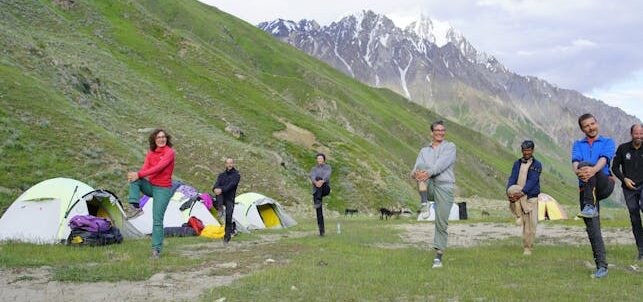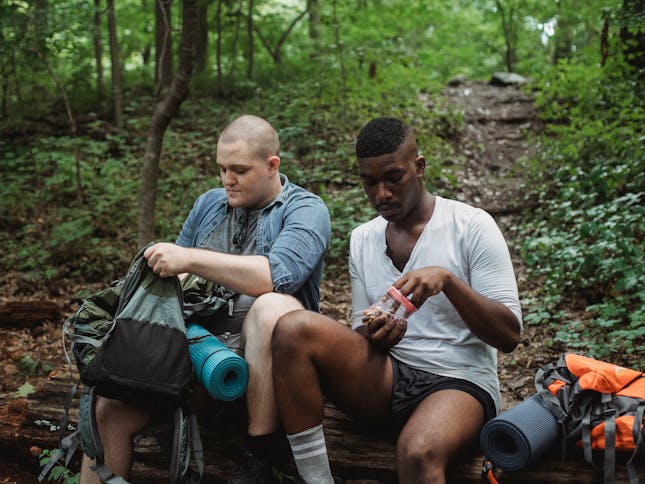
I firmly believe in hiking’s physical, mental and emotional benefits. My 40 years of hiking experience is testament to this. However, it’s no secret that it can be pretty taxing on your body. If you don’t give recovery the attention it deserves, you might find yourself dealing with sore muscles, lingering fatigue, or even injuries. Trust me, it’s not fun being out of commission because you skipped on post-hike care.
How to recover from a hike is crucial for making sure your body bounces back quickly. When you take the time to focus on recovering right, you’re not just preventing soreness and injury, but also setting yourself up for better performance on future hikes. From hydrating properly to easing muscle tension, the steps you take after your hike matter big time.
In this guide, I cover a range of effective recovery strategies that I use to help you shake off that post-hike tiredness. We’re talking everything from stretching those weary muscles to getting a good night’s sleep. Whether you’re a casual hiker or a seasoned trail warrior, these tips will keep you ready and raring to go for your next adventure.
Pre-Hike Preparation for Optimal Recovery
Your pre-hike preparation has a huge impact on your post hike recovery.
- Pack and Boots: Your hiking pack and boots need to fit like a glove. Ill-fitting gear is a direct ticket to soreness and discomfort. Don’t forget, new boots need breaking in before any long adventures.
- Trekking Poles: This is a personal choice but you may want to consider using trekking poles to reduce strain on your knees and ankles and help maintain balance, especially on uneven terrain. I have them but don’t always use them, particulary if a hike with a lot of scrambling is involved.
- Manage Pack Weight: Keep your pack’s weight at no more than 20% of your body weight. This can make all the difference in preventing fatigue and potential injuries. Switching to lighter gear over time can really help too.
Fueling Your Hike: Eating and Drinking Well
Let’s talk food and hydration.
- Meal Planning: Having enough of the right food can make or break your hike. Go for snacks and meals that keep your energy steady, like nuts and low-GI foods. They’ll give you lasting fuel without those dreaded sugar crashes.
- Hydration: This is non-negotiable. Start hydrating a few days before your hike. On the trail, drink before you feel thirsty. Dehydration sneaks up fast and can seriously mess with your performance. Salt intake plays a huge impact on cramping. I have a comprehensive guide on hydration for hikes.
- Magnesium: I’m a big believer in magnesium and it’s affect on muscle recovery. I supplement with magnesium a few days before and after my hikes. In fact, the US National Library of Medicine shows the findings of a study on the Impact of Magnesium Supplementation in Muscle Damage of Professional Cyclists Competing in a Stage Race.
Remember, timing is everything. Consistently munch and sip throughout your hike. This keeps your energy levels stable and helps you avoid cramps and fatigue.

Effective Planning for a Safe Hike
- Goal Setting: Set realistic goals. Don’t overestimate your abilities or underestimate the trail. Know your limits and stick to them.
- Be Adaptable: Adjust your mileage based on how you’re feeling. It’s better to cut the hike short than to push yourself too far and risk injury. I’ve been on many a hike where we’ve cut it short due to the difficulty making it too dangerous and impacting on our time constraints.
- Set the Right Pace: Pacing yourself is key. Start slow, find a comfortable rhythm, and take breaks when you need them. A steady pace prevents fatigue and keeps your energy up.
Warming Up and Cooling Down
Pre-Hike Warm Up
- Stretch: Pre-hike stretches are imperative to ensuring a good recovery as they can help prevent injury. My comprehensive guide to Dynamic Stretching is a must read.
- Start Slowly: Warming up is essential. Begin your hike at a slower pace, giving your muscles time to ease into the activity. This reduces the risk of strains and makes the trek more enjoyable.
End of Hike Cool Down
- Winding Down: As your hike winds down, don’t just stop abruptly. Gradually slow your pace to allow your heart rate and muscles to return to normal. This cool-down period helps prevent blood from pooling in your lower extremities and reduces the chances of dizziness and cramps.
Rehydrating and Refueling Post-Hike
- Hydration: Rehydration is crucial. After you’ve finished hiking, drink plenty of water to replace the fluids you’ve lost and flush out waste. This helps in reducing muscle pain and preventing dehydration-related headaches. Consider your mineral salt loss as well as water.
- Choose Your Food Wisely: Focus on a healthy meal with good quality protein and leafy greens —that help replenish lost essential minerals. Within 45 minutes after your hike, have a meal that combines both protein, vegetables and low GI carbohydrates. This mix aids muscle recovery and keeps your energy levels steady.

Stretching and Self-Massage Techniques
Stretching
Just like pre-hike stretching, stretching after a hike is non-negotiable. Focus on major muscle groups—hamstrings, quads, glutes, calves and hip flexors. This practice helps reduce muscle tension, improve flexibility, and enhance blood flow.
Massage
Self-massage is your friend. Use yoga poses or even everyday items like a hard-sided water bottle or your trekking poles to work out any kinks. A foam roller is ideal, but may have to wait until you arrive home. Massaging your legs helps circulate blood, relax muscles, and relieve soreness.
Take your time with each stretch and massage session. Rushing through doesn’t help. Pay attention to what your body needs and give those muscles the care they deserve.
My after hike remedy is a warm Epsom Salts bath where I stretch out my legs and go over my feet with a pumice stone. Removing any dead skin build up.
Additional Recovery Techniques: Compression Socks and Cool Showers
Compression Socks
Compression socks work wonders. Wear them for a few hours after your hike. They help reduce muscle fatigue by promoting better blood flow and speed up the elimination of lactates, which makes those heavy legs feel lighter.
Cool Showers
Cool showers can be surprisingly effective. Start with hot water to relax your muscles, then gradually lower the temperature to cool. This transition helps reduce swelling and muscle breakdown, which means fewer aches and pains.
These techniques are easy to incorporate into your routine and can make a noticeable difference in how quickly you recover. Your body will thank you for the extra TLC.
The Role of Sleep and Post-Hike Activity
Quality sleep is your ultimate recovery tool. Aim for at least 7 hours, and try to get to bed before midnight. Your body does a lot of its repair work while you’re snoozing, so make sure you’re getting enough shut-eye. I generally find I sleep like a baby after a day’s hike.
Don’t just plop down post-hike. Engage in light activities like walking or gentle stretching. This helps ease the transition from exertion to relaxation, keeping your muscles from stiffening up.
Balance is key. You need both rest and movement for optimal recovery. Listen to your body and adjust your post-hike routine to what feels best for you.
Happy Hiking!
Do you have any tips that help your exercise recovery? Share them here, I’d love to hear from you.

Hello when I think about recovering from a hike I generally think of getting clean first thing. Having a good shower and then checking myself over for any kind of bugs or ticks or whatever. Then I like to get my feet up and have a nice meal. That’s just me.
Jake, I also try and get in the bath as soon as I can but do stretch before hand.
Hi Lyn
I like how your article offers practical and insightful advice for hikers looking to rejuvenate after a strenuous adventure. The tips provided, such as rehydrating, stretching, and refueling with nutritious foods, are all essential for a quick and effective recovery. The emphasis on listening to your body and allowing adequate rest is particularly important, ensuring hikers can enjoy their next adventure without lingering fatigue or injury. The inclusion of specific stretches and nutritional advice would make this guide even more valuable. Overall, it’s a well-rounded and encouraging piece that promotes healthy post-hike habits.
I’ve definitely felt sore and exhausted after some of my longer hikes, and the tips here are spot on. I especially appreciate the advice on stretching and hydration—these have really made a difference in how quickly I bounce back. I also tried the suggestion of a gentle walk the day after a tough hike, and it really helped with muscle stiffness. Thanks for sharing!
Your 40 years of hiking experience really shines through in this guide! I couldn’t agree more about the importance of recovery after a hike—skipping it can definitely lead to some unpleasant consequences. I appreciate how you emphasize the connection between pre-hike preparation and post-hike recovery. It’s something that often gets overlooked but makes all the difference in how we feel afterward.
I love how you wrapped up the guide with simple, actionable recovery techniques like compression socks and cool showers. These are easy to implement but can make such a difference in recovery time. The emphasis on sleep and light post-hike activity is a great reminder that recovery is a holistic process. Thanks for sharing such a comprehensive and practical guide!
Hi Lyn,
This was such a great read! My wife and I hike a lot, usually taking on a couple of hours per trip, but honestly, I’ve never really given much thought to warm-ups or cool-downs when hiking—we’ve always done them before and after workouts, but not on the trails. After reading this, I’ll definitely be including both in our hiking routine, especially since I’m 50+ and need to take extra care of this old body. It makes total sense that stretching and easing into the hike can prevent some of the soreness and stiffness I’ve dealt with after longer trips. Your advice on winding down and gradually slowing the pace towards the end is something I’m going to start doing too!
I also really appreciate your tips on post-hike recovery—hydration, stretching, and even incorporating compression socks. It’s easy to forget how much our bodies go through after a good hike, but I can see how these steps make a difference, especially for longevity. I’m sure I’ll be feeling the benefits on our next trip! Looking forward to reading more of your content, and thanks again for sharing such practical and insightful advice.
Take care and happy hiking!
Opa